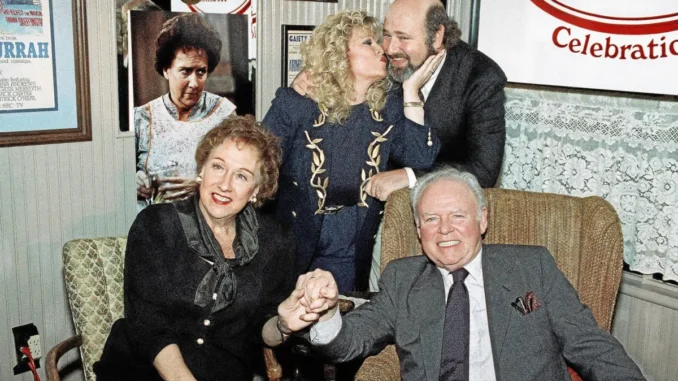
Last week’s 45th anniversary of the debut of “All in the Family” made me think of television series and television eras that were genuine breakthroughs.
In 1971, two producers of half-hour comedies began to dominate television. Norman Lear adapted a British series for American TV and Grant Tinker, who started with a sitcom featuring his then-wife, Mary Tyler Moore, as a single professional woman working in a TV newsroom, found a way to touch nerves and raise awareness about current ideas while keeping it all light and funny.
“All in the Family’s” Archie Bunker spouted ideas that sounded archaic and ignorant, but that reflected what many thought. He also had a heart of gold and knew when to capitulate, at least sentimentally, to his uneducated but often wise wife and modern daughter. Today, he might be running for President of the United States.
Mary Tyler Moore represented the liberated young woman who would leave small towns and come to a city, Minneapolis in her case, to seek a career, particularly one that was not especially welcoming to women (although broadcasting and newspapers tended to be more congenial than other professions; think Rosalind Russell as Hildy, a part original written for a man, in “His Girl Friday” or Lois Lane in the Superman comics.).
Lear was smart enough to use “All in the Family” to introduce characters who were as outspoken as Archie in their unique way. Beatrice Arthur’s Maude and Sherman Hemsley’s George Jefferson are two. They began life on “All in the Family” and were given their own series. Lear also produced Redd Foxx in “Sanford and Son,” another adaptation of a popular British program.
Tinker was just as canny. Valerie Harper’s character, Rhoda Morgenstern, and Cloris Leachman’s, Phyllis Lindstrom, earned their own series. Harper’s, “Rhoda,” was a big hit that suffered only when the quintessential zany single woman got married. Tinker also engineered a spin off that turned Lou Grant from a comic figure on Moore’s show to a major dramatic character in an hour-long program about a metropolitan newspaper. “Lou Grant” may have spawned as many budding journalists as Woodward and Bernstein or Seymour Hersh.
The interesting part of “All in the Family’s” success is it made its points via comedy. Lear’s writers knew their way around a joke and Carroll O’Connor, Jean Stapleton, Sally Struthers, and Rob Reiner, as well as Arthur and Hemsley knew how to play them and keep America laughing while thinking.
The level of sitcom represented by “All in the Family” doesn’t exist any more. “Modern Family” may pretend to be as groundbreaking and piercing, but it lacks the brittle smartness that was the hallmark of all the Lear and Tinker shows.
In intervening years, programs like “Friends,” “Seinfeld,” “30 Rock,” “The Office,” and “The Big Bang Theory,” have kept the laughs coming – and good laughs – but they never revealed the American psyche or delved as cleverly into salient issues as “All in the Family,” “Maude,” or “The Mary Tyler Moore Show” did. Sharp commentary became the province of cartoons.
Sensitivity towards political correctness precluded a human character from saying what Cartman, Homer Simpson, or Peter Griffin could spout with impunity. Matt Groening, Matt Stone, Trey Parker, and Seth McFarlane, even more than Jimmy Kimmel, Jimmy Fallon, or Stephen Colbert, are the ones who lampoon all sides with equal gusto and show what fools we mortals be on a regular, cathartic basis. Sitcoms have surrendered their ability to entertain and inform to them.
We should not despair. Though most series on tradition networks lack the incisiveness and forward-march mentality of the 1970s programs, cable has taken over to at least provide great drama writing.
As a theater buff and lifelong movie addict, it is difficult for me to say it, but the best and smartest writing today is not found on stage or on the screen, but on television that has little to do with CBS, NBC, ABC, Fox, or the CW. Programs like Showtime’s “Homeland” and Netflix’s “The House of Cards” pierce into politics better than anything on the original networks. F/X’s “Fargo,” Netflix’s “Orange is the New Black,” and Amazon Prime’s “Mozart in the Jungle,” entertain better and have sharper dialogue that many movies. How many people are waiting for Valentine’s Day to renew their devotion to “The Walking Dead” or to March to re-greet Keri Russell and Matthew Rhys on “The Americans?”
I don’t know that there is a cognate to “All in the Family” or the easier to imitate “Mary Tyler Moore Show today,” but what is good comes from many sources that don’t even need a big screen or expensive bit of furniture for you to enjoy it. I watch more television on my computer screen than I do on my official television.
Times, they are a-changing. But the most monumental change did occur 45 years ago with the airing of “All in the Family.”